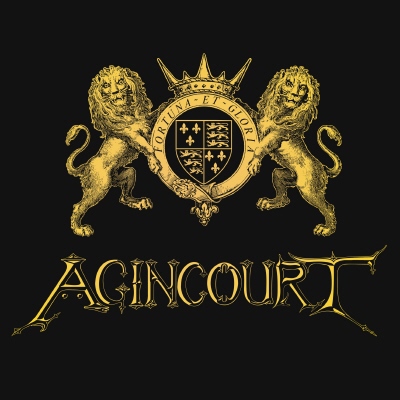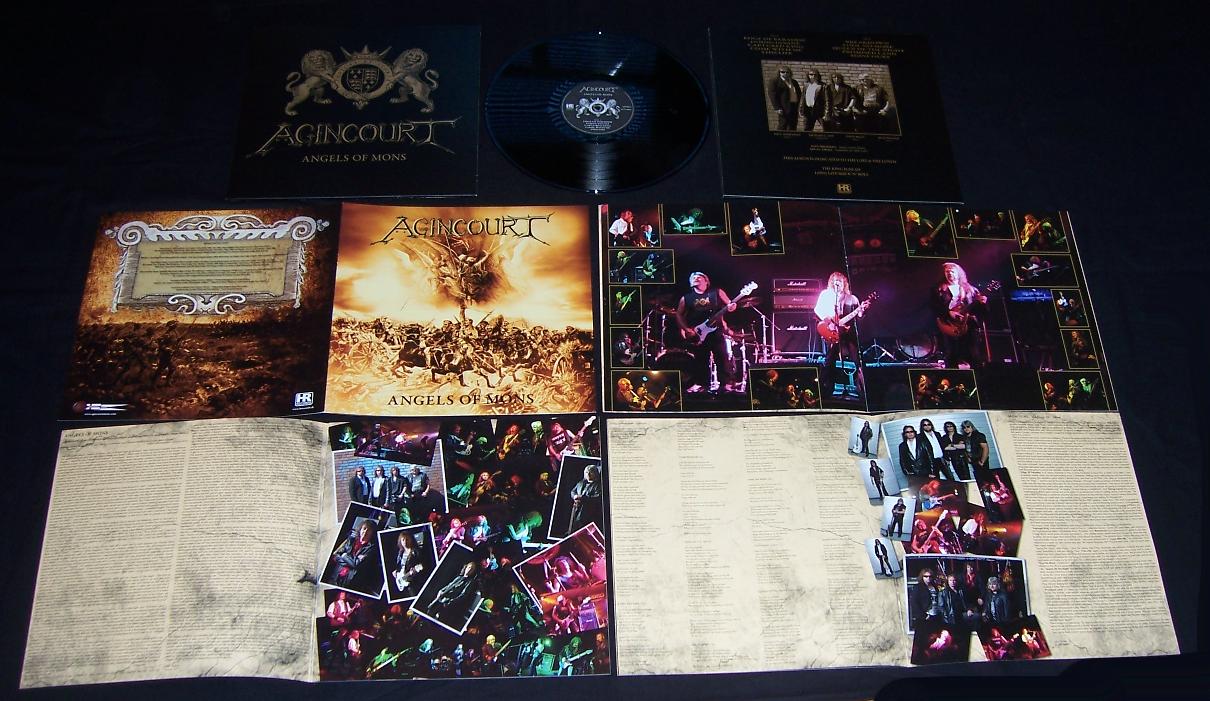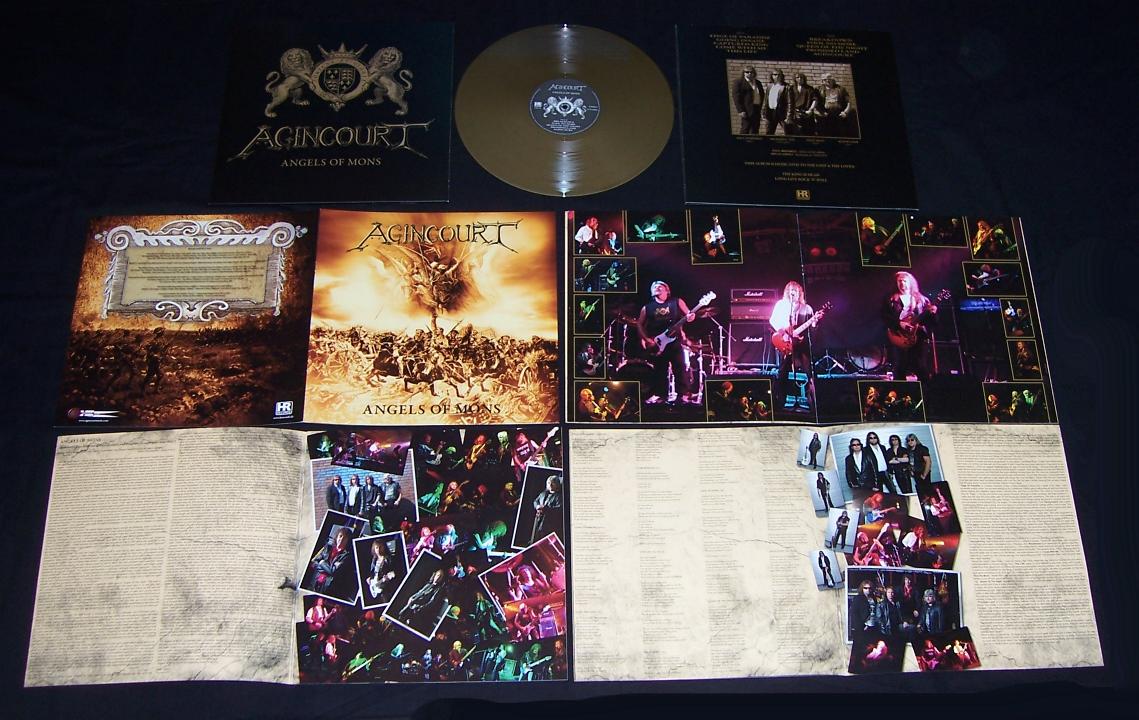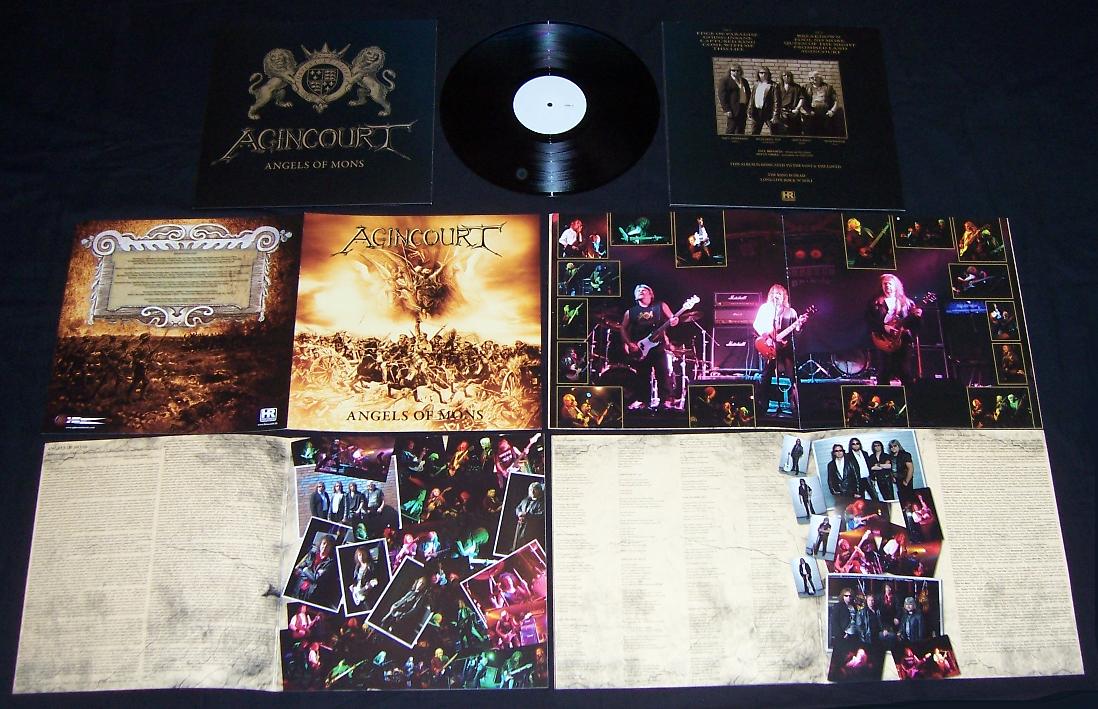 | ||||
| AGINCOURT - Angels of Mons | |
HRR 937LP, ltd 500, 250 x black + 250 x "camouflage" splatter vinyl, 425gsm heavy cardboard cover, insert, poster | |
| Richard E. Toy - vocals, guitar Paul Anderson - guitar Russ Weaver - bass Paul Brookes - drums | |
| 1. Edge of Paradise 2. Going Insane 3. Captured King 4. Breakdown 5. Come with Me 6. This Life 7. Fool No More 8. Queen of the Night 9. Promised Land 10. Agincourt | |
SOLD OUT! | |
“The title of album, ‘Angels Of Mons’, was a brilliant idea by Richard,” says Agincourt’s bassist Russ Weaver. “We were looking at using the title ‘Blood Sweat And Tears’ – which kind of sums up the history of the band! – but ‘Angels…’ made far more sense. In a nutshell,” he explains, “early in the First World War at Mons, it’s alleged that the British troops, up to their necks in trench mud and facing certain slaughter, suddenly through the mist and smog saw the bowmen from the battle of Agincourt, 500 years before, come to their aid. We felt this was a wonderful link, and that maybe some people would check the story out, in the same way that Iron Maiden must have led some fans to Mr Coleridge and his ‘Rime Of The Ancient Mariner’. The original CD artwork was then based around the title and the story. The sad fact these days is that with the death of veteran Harry Patch there is no-one left alive in the UK who fought in that war. I do find it sad that most teenagers have no idea what the First World War was, why it started and what happened. That in itself is an insult to every person who gave his or her life, whatever their nationality. The same is becoming true about World War Two. People should learn from history, and not make the same mistakes twice.”
A man of many great ideas, Agincourt’s guitarist/vocalist Richard E Toy was also responsible for the band’s name in the first place, twenty years ago.
“Agincourt was put together by myself, Richard and guitarist Frank Miracco in 1991,” recalls Russ. “We originally all went to the same secondary school at a time when the New Wave Of British Heavy Metal was really happening. We used to meet up down the front at Birmingham Odeon and dissect the gigs the next day. After hearing Iron Maiden’s first album, I was really taken with the bass sound of Mr. Harris. Frank was into Ritchie Blackmore and Michael Schenker, so it didn’t take long before the two of us had bought copy guitars and used to jam along to records together. In time, we progressed to jamming with various awful drummers and guitarists. But it was just covers; no real songs got written back then. We’d lost touch with Rich after we left school and it was a chance meeting between Frank and him at the bank one day that spawned the question ‘do you fancy a jam?’ We knew Rich had a guitar from school days, but were amazed when he passed on tapes to us of whole complete original songs. Complete songs!” The bassist emphasises the point. “This was serious! So we began to rehearse with God knows how many musicians – had more line-ups than MSG! – and originally went under the name of Stranger. It was Rich’s idea to change it to Agincourt. ‘Hmmm,’ we thought, ‘that’ll do nicely’.”
Having finally settled on a drummer, the quartet began gigging heavily around the Midlands, which in turn led to a desire to record a demo. The three-track tape was recorded at Coach House Studios in Lichfield (“an interesting fact,” interjects Russ, “is that the studios changed hands after we recorded there and Judas Priest used it for rehearsals during the Tim ‘Ripper’ Owens era...”) and featured ‘Going Insane’, ‘You & I’ and ‘Behind Closed Doors’.
“There is an earlier demo, our first ever attempt, that has never seen the light of day,” Russ points out. “‘Captured King’ and ‘Going Insane’… It was recorded on a four-track tape recorder by Rich in 1991 and a very good job he did, too. But only me and him have a copy, I believe, and I think that’s the way it should stay! It was just called ‘Agincourt’ and had a ‘chess pieces’ cover.
“But anyway,” he continues, “we sent the Coach House tape off to what had by then become the Sunday Rock Show on BBC’s Radio 1, hosted by Claire Sturgess. There was a feature called the Rock War, an unsigned bands competition: three bands per week, the listeners would vote for their favourite and the winner got to record a session for the show at the BBC’s famous Maida Vale studios. I was amazed to get a call from the show’s legendary producer Tony Wilson one Friday saying we were being played as part of Rock War that weekend (we’d specified ‘Going Insane’ as the song to play), and we won! So we went off to London to record a four-track session, which was a great experience, as you can imagine.” The session was recorded in February 1994 and featured ‘Agincourt’, ‘This Life’, ‘Going Insane’ and ‘Queen of The Night’. “It was produced and engineered by Dave Dade, a most wonderful man who was a complete and utter pleasure to work with. He did a lot of the most memorable Friday Rock Show sessions, as well as many live broadcasts for Radio 1, including Maiden’s Donington 1988 show. I would love to meet him again actually, as we have wonderful memories of that session.”
Fuelled by enthusiasm, the band went on to record a video the same year for ‘Queen Of The Night’. “We tried to get it played on MTV’s Headbangers Ball, hosted by Vanessa Warwick, but she came back to us and said that, unfortunately, to stand a chance of being included on the show, it had to be on Betacam format as that was the industry standard back then for televising stuff. So, we recorded the whole thing again on beta cam, but this time it got rejected because of that one word – grunge! It would have stood a better chance had we sounded like Nirvana or Pearl Drops but it never even got playlisted.” However, the band’s fairy godmother appeared in the form of ITV’s Noisy Mothers show. “Noisy Mothers loved it and played it, which produced a lot of, well, ‘Fan Mail’ and, to be honest, we couldn’t believe it!” he laughs, having already joked earlier that he’d found my letter to the band following the show still neatly filed in his box of correspondence! “Not bad considering the show went out at about 3 o’clock in the morning!” Well, some of us just can’t sleep…
Although another demo – ‘Living In The Real World’, ‘(I Don’t Want You To Be) A Stranger’ and ‘Promised Land’ – appeared in 1997 this proved to be the band’s swansong. After all, this was not the time to be playing traditional metal in the UK where happy-to-be-miserable grunge bands were dominating the airwaves and the clubs. “Exactly,” says Russ. “Time went on and our drummer at that time became restless, he wasn’t really into rock and metal and it began to show in him not turning up for rehearsals and eventually he left. Replacement drummers were always a nightmare: the good ones were already in bands and the ones that were available were awful. The flame began to die and it all just fizzled out. We had our memories – hearing our songs on Radio 1, recording at Maida Vale, seeing the video on the TV and people writing to us saying they liked us, and meeting Ronnie James Dio at a Birmingham studio during Sabbath’s ‘Dehumaniser’ pre-production (what a great man, very friendly, actually took the time to talk to us; a proper gentleman!) – but work took over and that was that.
“Our love for the music never died though,” he continues. “As time went by, Rich and myself talked about getting the band back together. We’d always thought that, maybe, we called it a day a bit too soon. But you have to remember that when we were doing the video for Noisy Mothers and the session for Radio 1 no-one in the U.K. was remotely interested in anything that wasn’t Nirvana, Pearl Jam or Soundgarden. OK, the exceptions were Iron Maiden, Metallica, and AC/DC etc, the big guns who always sell well whatever the fashion, but it was really hard being in a metal band at that time. Neat Records really liked what we did, and said they wanted to do something with us, but at that time it wouldn’t have been a viable proposition for them. The NWOBHM had become a term that was laughed at! ‘Kerrrang!’ at that time was slagging bands like Saxon, you know, the bands that actually spawned the magazine to start with! I never bought another copy after that.”
You and me both, mate!
“By 2008, we seemed to be going to gigs to watch so many bands that had got back together and that we’d first watched in 1980-something-or-other! We saw Diamond Head in Tamworth in 2007, which was a great gig. Y&T at Queens Hall, Nuneaton – that was incredible! And we got sick of looking at gig guides listing tribute band after tribute band, messing the whole industry up for people that want to write their own material. OK, it brings in punters and sells beer, but, c’mon, it doesn’t do a lot for ‘talent’! Look at ‘X Factor’: I would so love to see someone come on and do a song they have written themselves!”
The resurgence of metal was the catalyst Rich and Russ needed. “As I said, drummers had always been hard to come by in Birmingham,” says the bassist, “but Paul Brookes from Benediction and Marshall Law was a guy we’d used for a couple of gigs and the video shoot. We tracked him down and had a few rehearsals and it was great! Frank Miracco was not as keen on doing gigs as the rest of us and as a result he decided to leave us to it. We saw an ad for Paul Anderson, who was looking for an originals band, met and jammed with him and the rest, as they say, is history. We really wanted to get all our material in a format that wasn’t owned by the BBC like the session, or just existed in demo form.”
The solution, of course, was for the new-look Agincourt to record the album they should have made back in the Nineties. “A great idea, obviously, but where?” asks Russ, rhetorically. “And with whom? Paul Brookes had played with Andy Faulkner in Marshall Law. Andy had set up his own studio and had built up a fantastic reputation producing bands such as Shy, Handsome Beasts, Bolt Thrower and several other named bands, so we met with him and got on really well. It was a real pleasure working with Andy; he’s a great bloke, and he gets the best out of you without destroying the vibe that should be there. We got some guitars done, but then had to leave it for a few months as Beholder were booked in to record ‘The Awakening’.” They resumed a few months later but, sadly, bad things were around the corner. “In the space of six months Rich’s mom had a stroke, Paul’s dad died, Andy’s mom died and my mom was hospitalised with kidney failure. As a result, none of us were really available – or particularly interested, come to that. By March 2010 we’d got back on course, although there was one final hitch in that the digital recorders were doing what they wanted to and not what we wanted them to do. Thanks to a lot of hard work by Andy and Hanging Doll’s Alex Cooper – who then mixed the album and who is another fabulous person to work with – that problem was finally sorted and we were ready to roll by early 2011.”
But they now needed to find a full-time drummer. “When we wanted to get Agincourt back together in 2008 Paul Brookes was the first person who sprang to mind. But he worked with us purely on a session basis and was paid accordingly as a ‘hired hand’. It worked very well for us and on ‘Angels…’ he did a superb job. But we needed someone to become the fourth member of the band, which wasn’t Paul’s thing. I knew of Steve Riley and approached him; we jammed, he joined, and he is ideal – we all get on as great mates and there’s a very good vibe. It was cutting it fine though, as Steve only joined six weeks before our gig with Jameson Raid in July 2010.”
‘Angels Of Mons’ was released in March 2011, and the band are justifiably very proud of their debut. It may have been a long time coming, but it was certainly worth the wait. Russ agrees. “The end result is an album that has been totally financed by us and is a good representation of what Agincourt’s all about. It’s heavy but we also wanted big hooks and choruses, the sort of hooks that are truly memorable. So it’s full of songs that have choruses that you remember but with heavy guitars, solos and guitar harmonies. You can call it ‘Old School’ or NWOBHM, but to us it’s just good, traditional metal. At the end of the day, as Garry Bushell once said about us, we’ve got ‘more hooks than a pirates’ convention’ – and I’ll drink to that!”
The band have been selective about playing since they reformed. “We don’t want to play 300 gigs a year to people that don’t want to listen,” explains Russ. “To do the kind of gigs we have done so far is the direction we would love to take. There’s no point playing with thrash or death metal bands – it’s just the wrong audience. We’ve had a ball with Jameson Raid at the shows we’ve done together, and the British Steel festival was a great experience too. That’s the sort of things we would love to do more of, shows like that with ‘like-minded’ bands and fans. And although it’s a small market in the UK, the rest of Europe loves trad metal; if anyone knocked our door and invited us over we would willingly dig out our passports and book the flights straight away!”
As for anecdotes about the early days, Russ chuckles at the memory of one particular story: “one of the funniest moments of that era was one particular rehearsal. We used to practise at this little village hall, with only a farm opposite and field after field. Frank had this company van and, on the way there, the clutch cable snapped. ‘No worries,’ we thought, ‘we’re nearly there’ so we decided to push the van the rest of the way, even though it’s a dark country lane and the van is full of all our gear. Probably not the smartest move, on reflection, but all went well until we realised the van had seemingly become lighter. ‘Shit!’ shouted Frank. ‘I forgot it goes down hill here!’ And as he was running and trying to get back into the driver’s seat to stop the bloody thing, Rich and I suddenly noticed what the drummer had got on his feet: slippers! He was wearing his slippers! We just wet ourselves laughing and fell over in the middle of the road, watching these slippers running after Frank, and every swear word from Frank getting fainter the further he ran after his runaway van. Thankfully, we got there OK, but the slippers were a write-off!
“So anyway, after rehearsal, we needed to call someone to get us back to ‘civilisation’; no mobile phones back then, of course. So I volunteered to pop over to the farm and ask if I could use their phone. When I got there, there was no answer from the house, but I could see a light from a barn and a horrendous noise; it sounded like, I don’t know, turkeys being strangled or something… I entered the barn... Oh my God, everywhere I looked there were turkeys, hundreds of them, having their necks broken. What a sight! The Turkey Strangler stopped what he was doing, looked up at me and asked if I could come back tomorrow as the turkeys weren’t ready for sale yet! I asked if I could use his telephone and explained our situation, and he pointed to another chap who was busy cutting the heads off the dead birds – with garden shears! This chap was covered in blood and gestured to the phone, which was also dripping with turkey blood. I made the call and after I’d hung up it looked like my ear had been cut off. As I said thanks and went to leave Turkey Strangler was livid that I hadn’t offered him any money for the call! Fearing a Texas Chainsaw Massacre incident I gave him 50p and ran like hell!”
Back in the present day, Rich and Russ are already considering material for their follow-up album. “We feed off each other’s enthusiasm and, let’s face it, this music is like a religion, or supporting the same football team all your life. You never lose it, its always there, and even after we’d split before we would still talk about the band with great passion and wonder about getting it back together again – until we finally did! We would love to open for more NWOBHM bands and get to the stage where we can headline our own shows. In the meantime, though, every positive thing that happens, every good word said or written about us, just drives us on and on. We’ve got a lot of lost time to make up for.”
The Angels of Mons, incidentally, are a complete fabrication. The source is a short story ‘The Bowmen’ by Arthur Machen (a writer of tales about the supernatural) written and published in ‘The Evening News’ in 1914, shortly after the battle. It tells how the English troops are spared after one of their number calls on St George to save them from certain death and his invocation summons up the spirits of the long dead Agincourt archers. The London newspaper neglected to mention that their ‘report’ was actually a work of fiction and from such humble origins the legend was born. In a similar way, in years to come ‘Angels Of Mons’ may too be looked upon as a legendary release from a hard-working, well-deserving and really great bunch of guys.
‘Angels Of Mons’ is just the beginning; trust me on this…
John Tucker
August 2011


